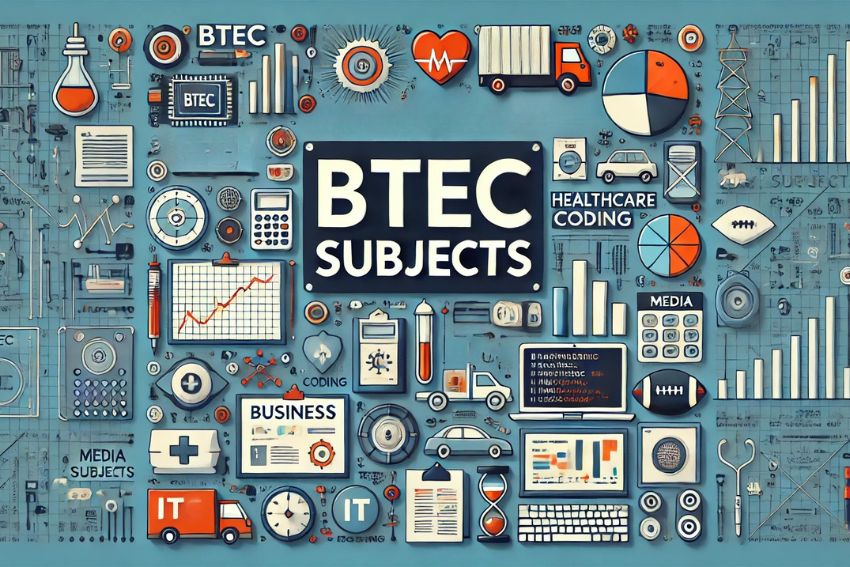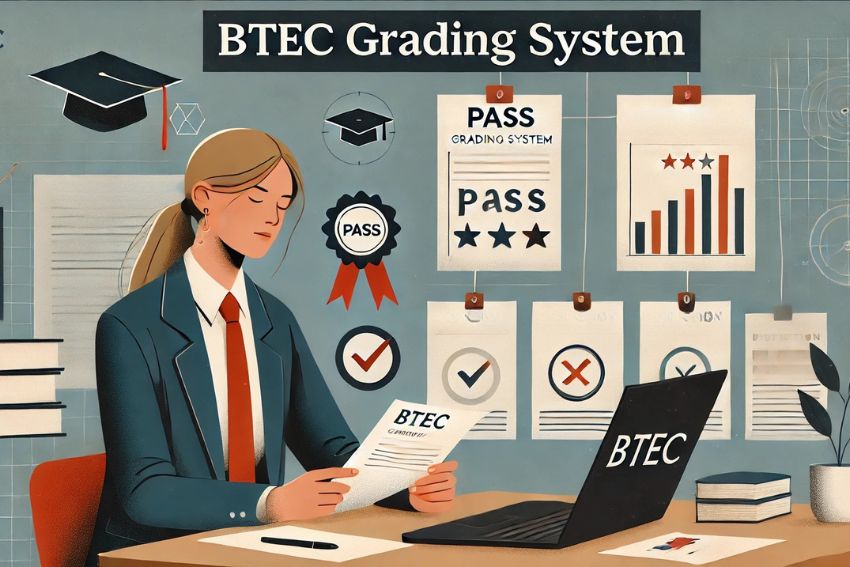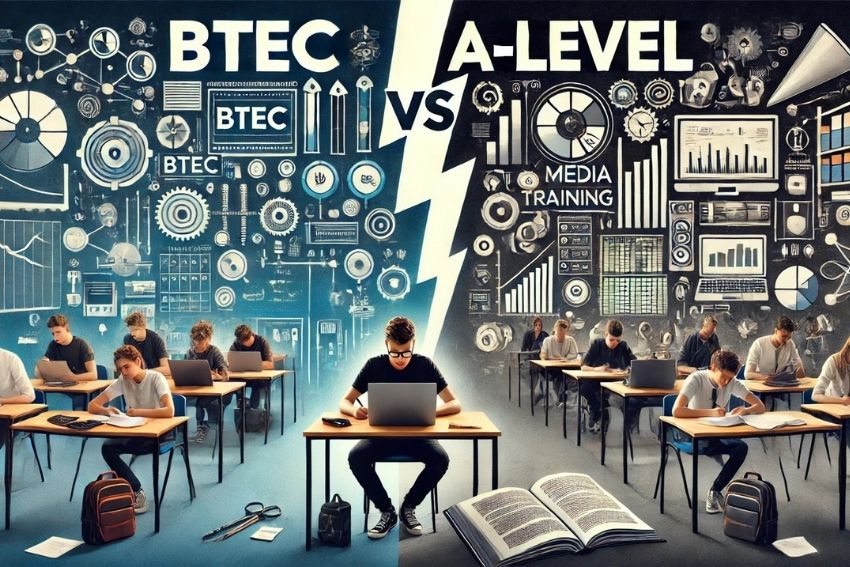What Is BTEC? A Complete Guide to BTEC Qualifications, Levels, and Equivalents
What Is BTEC? If you’re exploring different education pathways, BTEC qualifications offer a practical, skills-based alternative to A-Levels. Designed for students who prefer hands-on learning over traditional exams, BTECs focus on coursework, real-world applications, and industry experience.
Unlike A Levels, which rely heavily on exams, BTECs use continuous assessment through projects and assignments. This makes them ideal for students who excel in practical subjects like Business, Engineering, Health and Social Care, and IT. A BTEC Level 3 qualification is equivalent to A-Levels, meaning it can lead to university, apprenticeships, or direct employment.
In this guide, we’ll break down the different types of BTECs, their equivalents, and how they compare to A Levels. Whether you’re considering a BTEC diploma equivalent to A-Levels or want to understand the difference between BTECs and A-Levels, this article will help you make an informed decision.

What is BTEC?
So, what is BTEC?- BTEC qualification is a practical, career-focused alternative to traditional academic courses like A-Levels. BTEC stands for Business and Technology Education Council, the organisation that originally developed these qualifications.
Unlike A Levels, which rely on final exams, BTECs focus on coursework, practical projects, and continuous assessment. This makes them ideal for students who prefer hands-on learning rather than memorising information for exams.
BTECs are available at different levels, with BTEC Level 3 equivalent to A Levels, making them a recognised route to university. Lower-level BTECs, like Level 1 and Level 2, provide stepping stones to further study or vocational careers.
Different Types of BTEC Qualifications
BTEC qualifications are designed for students who want to develop practical skills in specific industries. They range from Entry Level to Level 7, with each level offering a deeper understanding of the subject. BTECs cover a wide range of sectors, including business, engineering, health and social care, and many more.
A key feature of BTECs is their hands-on learning approach, making them different from the theoretical focus of A Levels. Instead of relying on final exams, BTECs are assessed through coursework, assignments, and practical tasks. This continuous assessment method allows students to demonstrate their skills over time rather than in one final test.
BTECs are widely recognised by employers and universities, offering flexible study options such as full-time, part-time, and online learning. Completing a BTEC diploma is equivalent to A-Levels, that can lead to higher education, apprenticeships, or direct employment, making it this qualification valuable for various career paths.Advantages of Pursuing a BTEC
BTEC Courses and Subjects
One of the biggest advantages of BTEC courses is the wide variety of subjects available, catering to different interests and career goals. Unlike traditional academic routes, the BTEC curriculum is designed to provide practical, industry-relevant knowledge, making it a great choice for students who prefer hands-on learning.
Some of the most popular BTEC subjects include:
- Business – Covers entrepreneurship, finance, and marketing.
- Engineering – Focuses on mechanical, electrical, and civil engineering principles.
- Health and Social Care – Prepares students for careers in nursing, social work, and healthcare.
- Information Technology (IT) – Develops skills in coding, cybersecurity, and digital media.
- Sport Science – Ideal for those interested in fitness, coaching, and sports management.
- Performing Arts – Covers acting, dance, and theatre production.
The BTEC curriculum is designed to be career-focused, helping students gain real-world skills that are valued by employers and universities. Whether you want to go straight into work or progress to higher education, BTEC subjects provide a strong foundation for future success.

BTEC vs. A-Level: Key Differences
When deciding between BTEC vs A-Level, understanding the difference between BTECs and A-Levels is essential. Both qualifications lead to university and careers, but they suit different learning styles and assessment preferences.
Assessment Methods: Coursework vs. Exams
The biggest difference lies in how students are assessed. BTECs use continuous assessment, meaning students complete assignments, projects, and practical tasks throughout the course. In contrast, A-Levels are exam-based, with final tests at the end of two years determining overall grades.
For students who prefer practical learning and ongoing feedback, BTECs offer a more structured approach. A-Levels, on the other hand, require strong exam skills and independent study to succeed.
Learning Styles: Practical vs. Theoretical
BTECs cater to hands-on learners who enjoy real-world applications of knowledge. Subjects often include work placements, industry projects, and case studies to build practical skills.
In comparison, A Levels are more theoretical, focusing on critical thinking, research, and essay-based learning. This makes A-Levels the preferred choice for students aiming for academic degrees in subjects like Medicine, Law, and Sciences.
BTEC and A-Level Grades: How They Compare
Both qualifications are graded differently but can be converted into UCAS points for university entry. For example:
- BTEC Distinction (D) ≈ A-Level Grade A
- BTEC Merit (M) ≈ A-Level Grade C
- BTEC Pass (P) ≈ A-Level Grade E
Choosing between BTECs and A-Levels depends on your learning preferences, career goals, and how you perform best in assessments.
What is BTEC? Pros and Cons
If you’re considering a BTEC qualification, it’s important to weigh the pros and cons of BTECs before making a decision. While BTECs offer practical experience and a flexible learning style, they also come with some limitations, particularly for university entry.
Advantages of BTEC Qualification
- Hands-on Learning – BTECs focus on practical skills rather than pure theory, making them ideal for students who prefer real-world applications.
- Continuous Assessment – Unlike A Levels, which rely on final exams, BTEC students are assessed through assignments, coursework, and projects.
- Industry-Relevant Skills – Many BTEC courses include work placements, giving students valuable experience before they enter the job market.
- Flexible Entry Routes – BTECs can lead to higher education, apprenticeships, or direct employment, depending on your career goals.
Disadvantages of BTEC Qualification
- Limited University Options – Some top universities prefer A Levels over BTECs, especially for competitive courses like Medicine and Law.
- Less Theoretical Depth – BTECs provide specialist knowledge, but they may not offer the same academic depth as A-Levels in certain subjects.
- More Coursework Pressure – Since BTECs are coursework-based, students must consistently meet deadlines throughout the course rather than relying on final exams.
The disadvantages of BTECs should not discourage students, but they should be considered when choosing the right qualification for future goals. If you enjoy practical learning and industry-focused education, a BTEC qualification could be the perfect fit.
What is BTEC Qualification and its Equivalents?
If you’re wondering how BTEC qualifications compare to traditional academic levels, it’s important to understand their equivalents to GCSEs and A Levels. BTECs are available at different levels, each designed to match a specific stage of education or career progression.
What is BTEC Diploma Equivalent: GCSEs and A Levels
BTEC Level 1 & 2 – Equivalent to GCSEs, suitable for students aged 14-16 or those looking for a foundation in vocational subjects.
Level 3 BTEC Equivalent to A-Levels – A BTEC National Diploma at Level 3 is widely accepted by universities and is equivalent to three A Levels if taken as an Extended Diploma.
BTEC Higher Nationals (Level 4 & 5) – Equivalent to the first and second year of university, offering a pathway to higher education or employment.
What is a BTEC Level 3 Equivalent To?
A BTEC Level 3 qualification can be compared to A Levels in terms of difficulty and university recognition. The BTEC Extended Diploma (Level 3) is equivalent to three A Levels, while the BTEC Diploma (Level 3) is worth two A Levels. A BTEC Subsidiary Diploma is roughly equal to one A Level.
Understanding BTEC diploma equivalents helps students decide whether a vocational or academic route best suits their future aspirations.
Conclusion
To sum up the question what is BTEC-it is a qualification that offer a practical, career-focused alternative to A Levels, making BTECs a great choice for students who prefer hands-on learning. These qualifications provide real-world skills, helping students prepare for higher education, apprenticeships, or direct employment.
Understanding what BTECs are, their equivalents to GCSEs and A Levels, and the difference between BTECs and A Levels is essential when deciding on the right path. While BTEC qualifications are highly valued for their industry relevance and continuous assessment, they may not be suitable for all university courses, especially in highly academic fields.
If you’re still unsure about your options, online tutors can provide extra help to guide you in choosing the best qualification for your future. Whether you’re aiming for a BTEC Level 3 equivalent to A Levels or exploring different BTEC courses, the right support can make a big difference.
Whatever path you choose, stay committed to your learning and make the most of the opportunities available to you!
FAQs:
What is BTEC?
A BTEC (Business and Technology Education Council qualification) is a vocational qualification designed to provide hands-on learning and practical skills. It is recognised by universities and employers as an alternative to A-Levels.
What is an A Level?
An A Level (Advanced Level) is a traditional academic qualification taken by students in the UK, usually over two years. It is exam-based and widely accepted by universities for degree courses.
What’s the difference between BTECs and A-Levels?
BTECs focus on coursework and practical learning, while A-Levels rely on final exams.
BTECs prepare students for careers and apprenticeships, whereas A-Levels are more academic and university-focused.
BTEC qualifications use a grading system (D, D, M, P)**, while A-Levels follow the A-E system.
What are the different types of BTEC?
BTECs come in various levels, each designed for different education and career paths:
- BTEC Level 1 & 2 – Equivalent to GCSEs, offering foundation skills.
- BTEC Level 3 – Equivalent to A-Levels, accepted by universities.
BTEC Level 4 & 5 (Higher Nationals) – Equivalent to the first and second year of university, focusing on specialist skills.
What is BTEC Level 2 equivalent to?
A BTEC Level 2 qualification is equivalent to four or five GCSEs (grades 4-9). It provides students with the knowledge needed to progress to BTEC Level 3 or apprenticeships.
What is BTEC Level 4 equivalent to?
A BTEC Level 4 (Higher National Certificate – HNC) is equivalent to the first year of university. It focuses on industry-specific skills, making it ideal for career progression or further study at Level 5 (Higher National Diploma – HND).








